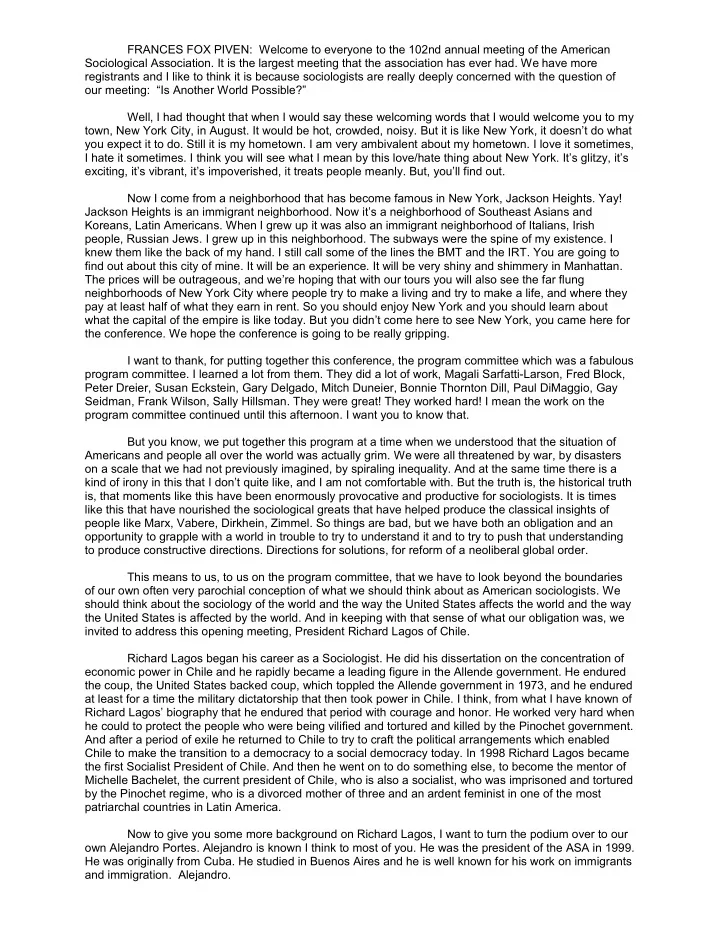

FRANCES FOX PIVEN: Welcome to everyone to the 102nd annual meeting of the American Sociological Association. It is the largest meeting that the association has ever had. We have more registrants and I like to think it is because sociologists are really deeply concerned with the question of our meeting: “Is Another World Possible?” Well, I had thought that when I would say these welcoming words that I would welcome you to my town, New York City, in August. It would be hot, crowded, noisy. But it is like New York, it doesn’t do what you expect it to do. Still it is my hometown. I am very ambivalent about my hometown. I love it sometimes, I hate it sometimes. I think you will see what I mean by this love/hate thing about New York. It’s glitzy, it’s exciting, it’s vibrant, it’s impoverished, it treats people meanly. But, you’ll find out. Now I come from a neighborhood that has become famous in New York, Jackson Heights. Yay! Jackson Heights is an immigrant neighborhood. Now it’s a neighborhood of Southeast Asians and Koreans, Latin Americans. When I grew up it was also an immigrant neighborhood of Italians, Irish people, Russian Jews. I grew up in this neighborhood. The subways were the spine of my existence. I knew them like the back of my hand. I still call some of the lines the BMT and the IRT. You are going to find out about this city of mine. It will be an experience. It will be very shiny and shimmery in Manhattan. The prices will be outrageous, and we’re hoping that with our tours you will also see the far flung neighborhoods of New York City where people try to make a living and try to make a life, and where they pay at least half of what they earn in rent. So you should enjoy New York and you should learn about what the capital of the empire is like today. But you didn’t come here to see New York, you came here for the conference. We hope the conference is going to be really gripping. I want to thank, for putting together this conference, the program committee which was a fabulous program committee. I learned a lot from them. They did a lot of work, Magali Sarfatti-Larson, Fred Block, Peter Dreier, Susan Eckstein, Gary Delgado, Mitch Duneier, Bonnie Thornton Dill, Paul DiMaggio, Gay Seidman, Frank Wilson, Sally Hillsman. They were great! They worked hard! I mean the work on the program committee continued until this afternoon. I want you to know that. But you know, we put together this program at a time when we understood that the situation of Americans and people all over the world was actually grim. We were all threatened by war, by disasters on a scale that we had not previously imagined, by spiraling inequality. And at the same time there is a kind of irony in this that I don’t quite like, and I am not comfortable with. But the truth is, the historical truth is, that moments like this have been enormously provocative and productive for sociologists. It is times like this that have nourished the sociological greats that have helped produce the classical insights of people like Marx, Vabere, Dirkhein, Zimmel. So things are bad, but we have both an obligation and an opportunity to grapple with a world in trouble to try to understand it and to try to push that understanding to produce constructive directions. Directions for solutions, for reform of a neoliberal global order. This means to us, to us on the program committee, that we have to look beyond the boundaries of our own often very parochial conception of what we should think about as American sociologists. We should think about the sociology of the world and the way the United States affects the world and the way the United States is affected by the world. And in keeping with that sense of what our obligation was, we invited to address this opening meeting, President Richard Lagos of Chile. Richard Lagos began his career as a Sociologist. He did his dissertation on the concentration of economic power in Chile and he rapidly became a leading figure in the Allende government. He endured the coup, the United States backed coup, which toppled the Allende government in 1973, and he endured at least for a time the military dictatorship that then took power in Chile. I think, from what I have known of Richard Lagos’ biography that he endured that period with courage and honor. He worked very hard when he could to protect the people who were being vilified and tortured and killed by the Pinochet government. And after a period of exile he returned to Chile to try to craft the political arrangements which enabled Chile to make the transition to a democracy to a social democracy today. In 1998 Richard Lagos became the first Socialist President of Chile. And then he went on to do something else, to become the mentor of Michelle Bachelet, the current president of Chile, who is also a socialist, who was imprisoned and tortured by the Pinochet regime, who is a divorced mother of three and an ardent feminist in one of the most patriarchal countries in Latin America. Now to give you some more background on Richard Lagos, I want to turn the podium over to our own Alejandro Portes. Alejandro is known I think to most of you. He was the president of the ASA in 1999. He was originally from Cuba. He studied in Buenos Aires and he is well known for his work on immigrants and immigration. Alejandro.
Recommend
More recommend